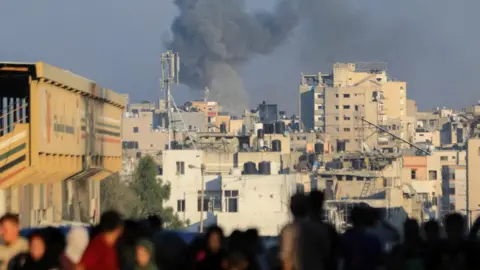Israeli forces bombard Gaza City as tanks re-enter central areas
Palestinians in Gaza City say they have experienced one of the most intense Israeli bombardments since Israel launched its war on Hamas after the group’s unprecedented 7 October attack.
Columns of Israeli tanks are reported to be closing in on the centre of the city from several different directions.
The Gaza Civil Emergency Service says it believes a number of people have been killed but has so far been unable to reach them because of fighting in several districts in the east and west of Gaza City.
The Al-Ahli Baptist hospital is reported to have been evacuated, with its patients being taken to one of the only medical facilities still functioning in the area – the already overcrowded Indonesian hospital.
Ahead of the assault, the Israeli army issued evacuation orders for several neighbourhoods in the centre of the city, including Tuffah, Daraj and the Old City.
But one of the areas that has come under the most intense assault, Tel al-Hawa, was not included in the evacuation order that was posted online with a map by the Israel Defense Forces’ (IDF) Arabic spokesperson on Sunday.
On Monday afternoon, the IDF issued a new order that covered Tel al-Hawa as well as the Sabra and al-Rimal areas, to the north and west.
One resident of Gaza City, Abdel Ghani asked: “The enemy is behind us and the sea is in front of us, where shall we go?”
Others have also told the BBC that they do not know where to go. They say that only one route remains – to go north towards the port area of Gaza City.
Some fled districts after receiving an evacuation order, only to find that the area they moved to was coming under Israeli bombardment.
 Reuters
ReutersIn al-Rimal, a freelance cameraman working for the BBC says that he did not receive any evacuation orders, but later learnt that his neighbour did.
He left the area with his family and headed north. They are now in the port area but lack basic necessities. He says he is struggling to find water for his children.
In a statement, the IDF confirmed that it launched what it called a new operation in Tel al-Halwa overnight, following what it said was intelligence of Hamas and Palestinian Islamic Jihad infrastructure and fighters in the area.
The military also said that it was operating at the headquarters of the UN agency for Palestinian refugees, Unrwa, in the area.
The IDF said that at the start of the operation, it gave warnings to civilians – and it said that it would open up a humanitarian corridor for people to leave the area.
The latest Israeli offensive in Gaza comes as hopes have been rising that a ceasefire deal might finally be agreed.
A senior Palestinian official familiar with the talks has told the BBC that indirect negotiations between the Hamas and Israeli negotiating teams, mediated by Qatar and Egypt, will start in Doha within the next 48 hours.
The official also said a preparatory meeting was due to take place in Cairo on Monday between CIA director William Burns, the head of Israel’s Mossad intelligence agency, David Barnea, and the head of Egyptian Intelligence, Abbas Kamel.
The three intelligence chiefs are then all due to travel to Doha on Tuesday.
The official outlined to the BBC several key sticking points from the Hamas perspective:
- Hamas wants Israeli forces to withdraw from both the Rafah crossing with Egypt and the Philadelphi corridor, a strip of land running along the Egyptian border
- Israel has vetoed Hamas’s demand for release from Israeli prisons of 100 senior figures from the Palestinian Islamic Jihad and Fatah political factions
Hamas’s negotiating team has already dropped its requirement for Israel to accept a permanent ceasefire as a precondition for any potential deal.
The official said the negotiating process would be very long and complex, but that there was some degree of hope that it might work this time.
On Sunday, a statement by the office of the Israeli Prime Minister, Benjamin Netanyahu, may have somewhat dampened expectations by insisting that any deal must not stop Israel from resuming fighting in Gaza until its war objectives are met.
Mr Netanyahu has repeatedly defined those aims as being the eradication of Hamas, both militarily and politically.



